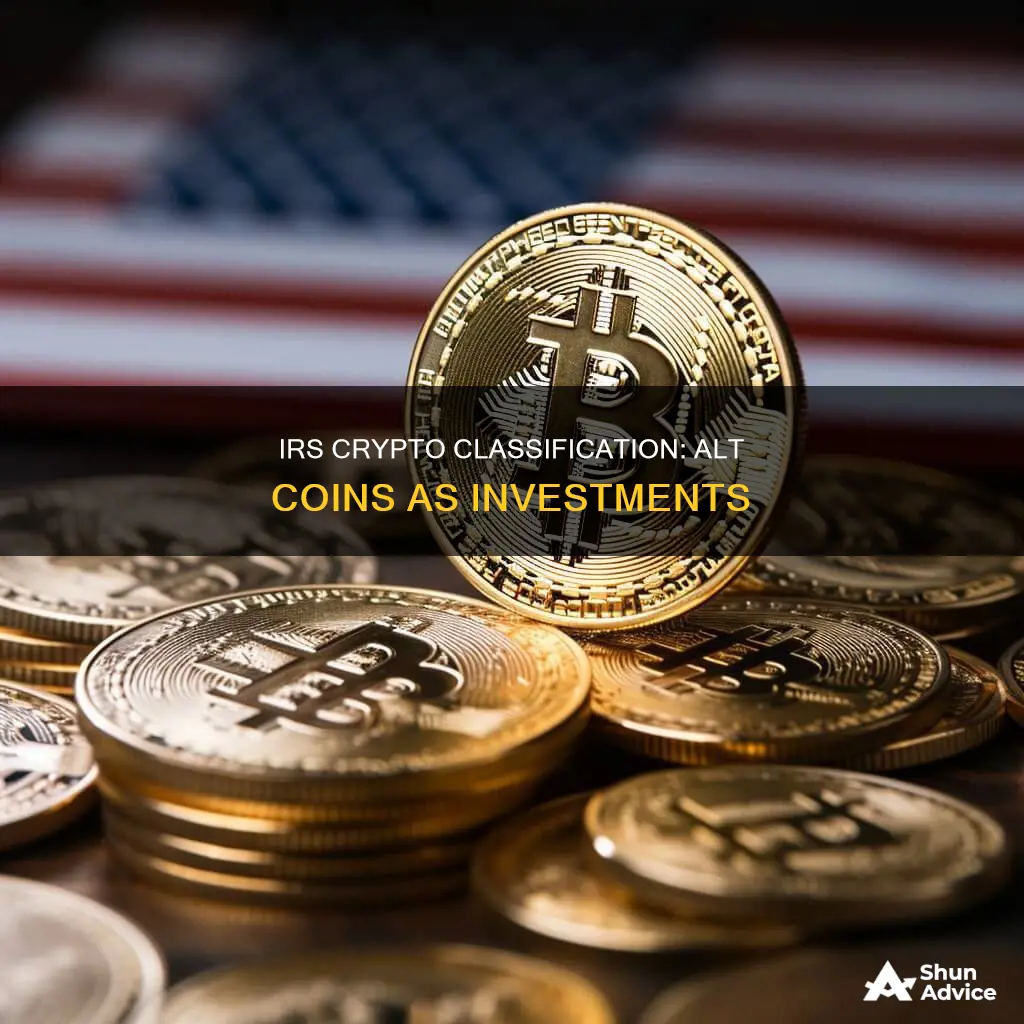
Altcoins are alternatives to Bitcoin and traditional fiat money. They are generally defined as all cryptocurrencies other than Bitcoin. However, some people consider altcoins to be all cryptocurrencies other than Bitcoin and Ethereum. There are tens of thousands of altcoins on the market, and they make up nearly 40% of the total cryptocurrency market. The IRS considers coins and tokens as property for tax purposes.
What You'll Learn

Altcoins as alternatives to Bitcoin
Bitcoin has been a trailblazer, introducing a wave of cryptocurrencies built on a decentralised peer-to-peer network. However, it is not the only cryptocurrency available, and there are several alternatives to Bitcoin, or 'altcoins', that have held on throughout steep price climbs and nosedives.
Altcoins are generally defined as all cryptocurrencies other than Bitcoin. The term 'altcoin' is a combination of the two words 'alternative' and 'coin'. Altcoins can be further categorised into several types based on what they were designed for. For example, payment tokens are designed to be used as currency, while security tokens represent fundraising efforts or ownership.
Some of the most important altcoins by market capitalisation include:
- Ethereum (ETH): a decentralised software platform that enables smart contracts and decentralised applications.
- Tether (USDT): one of the first and most popular stablecoins, which aims to peg its market value to a currency to reduce volatility.
- Binance Coin (BNB): a utility cryptocurrency that operates as a payment method for fees associated with trading on the Binance Exchange.
- Cardano (ADA): an "Ouroboros proof-of-stake" cryptocurrency created with a research-based approach by engineers, mathematicians, and cryptography experts.
- Solana (SOL): a blockchain platform designed to support decentralised applications.
- Dogecoin (DOGE): seen by some as the original "memecoin", Dogecoin was created as a joke in 2013 but has since become a prominent cryptocurrency.
- Litecoin (LTC): a fast alternative to Bitcoin, with a block generation time of 2.5 minutes compared to Bitcoin's 10 minutes.
Altcoins have several advantages over Bitcoin. For example, they can offer faster transactions, allow for larger total amounts of coins, or have different mining methods. Additionally, some altcoins have newer features than Bitcoin, such as the ability to handle more transactions per second or the use of different consensus algorithms.
However, it is important to note that the cryptocurrency market, regardless of the type of coin, is young and volatile. Therefore, it is best to approach all cryptocurrencies cautiously and do your research before investing.
Uni Coin: A Smart Investment Decision?
You may want to see also

Altcoins as investments
Altcoins are alternative coins to Bitcoin, and they make up nearly 40% of the total cryptocurrency market. They are any cryptocurrency that isn't Bitcoin (BTC). These coins were created after Bitcoin and often present themselves as better alternatives to the premier cryptocurrency.
There are tens of thousands of altcoins on the market. Most are designed and released by developers with different visions or uses for their tokens or cryptocurrency. Some altcoins use different consensus mechanisms to validate transactions, open new blocks, or attempt to distinguish themselves from Bitcoin by providing new or additional capabilities or purposes.
The first altcoin was Litecoin, forked from the Bitcoin blockchain in 2011. Litecoin uses a different proof-of-work (PoW) consensus mechanism than Bitcoin, called Scrypt, which is less energy-intensive and quicker than Bitcoin's SHA-256 PoW consensus mechanism.
Other notable altcoins include Ethereum, the second-largest cryptocurrency behind Bitcoin; USD Coin, a stablecoin pegged to the US dollar; Dogecoin, the original meme coin; and Cardano, an early adopter of the proof-of-stake consensus mechanism.
Altcoins can be attractive investments because they offer a much higher upside in terms of percentage gain. However, they also come with a much higher risk. When considering investing in altcoins, it is essential to do your research and understand the risks. Many altcoins are scams or have lost developer and community interest, and it is challenging to determine their use cases.
If you are thinking about investing in altcoins, it is recommended to only invest money you can afford to lose. Cryptocurrency, in general, is a young and volatile market, so it is best to approach all cryptocurrencies cautiously.
Altcoin Investing Guide for Indians: Getting Started
You may want to see also

Altcoins as a form of fiat money
Altcoins are defined as all cryptocurrencies other than Bitcoin (BTC). However, some people also exclude Ethereum (ETH) from the definition of altcoins. Altcoins are designed and released by developers with different visions or uses for their tokens or cryptocurrency. They are designed to improve upon the perceived limitations of the cryptocurrency they are forked from or competing with.
Altcoins can be purchased with fiat money, but the process is more complicated than with Bitcoin. Unlike Bitcoin, altcoins are not readily convertible to fiat currency. Only a handful of cryptocurrency exchanges can convert altcoins to fiat currencies. This requires navigating through multiple exchanges, which can make cashing out a confusing process.
Fiat currency, also known as real or physical money, has been the most widely accepted means of exchange, store of value, and unit of account for over a millennium. Cryptocurrencies, on the other hand, are still relatively new and volatile. While some people expect cryptocurrency to replace fiat worldwide, others are skeptical, especially in developed countries.
The future of currency is uncertain, but several scenarios could emerge. One possibility is that a country's government recognizes cryptocurrency as legal tender, replacing its fiat currency. However, this is unlikely to occur in most areas. Another scenario is a hybrid system where both digital assets and fiat currencies are recognized and used. This seems to be the most likely outcome, as it is already the case in many areas. A third option is that a society rejects cryptocurrency entirely and continues to use its established fiat currency.
The current state of the altcoin market indicates that it is unlikely to consolidate into a single cryptocurrency. Instead, it will probably coalesce around a few altcoins with strong utility, use cases, and a solid blockchain purpose, which will dominate the markets.
Mongoose Coin: A Smart Investment Choice?
You may want to see also

Altcoins and their risks
The term "altcoin" refers to any cryptocurrency that is not Bitcoin. Some people also exclude Ethereum from this definition, considering it separately from altcoins. Altcoins are generally defined as all cryptocurrencies other than Bitcoin and sometimes Ethereum. Altcoins are a class of cryptocurrency that encompasses everything that isn't Bitcoin.
There are tens of thousands of altcoins on the market, and they vary widely in price, function, and potential investment value. They range from established products to obscure projects that were never meant to be taken seriously.
The main difference between Bitcoin and altcoins is that while Bitcoin can be incrementally changed, altcoins offer developers the opportunity to quickly depart from Bitcoin's path. Altcoins may be more appealing to some investors as they aim to be more advanced than Bitcoin. However, they may also be considered riskier investments due to their newer status and smaller market cap compared to Bitcoin.
Altcoins have the same basic premise as Bitcoin: to use blockchain technology as an incorruptible, distributed public ledger, recording transactions only if there is consensus that the transaction is legitimate. However, many altcoins have taken this premise and either used it to achieve different goals or sought to improve perceived flaws in Bitcoin.
For example, Litecoin, a clone of the Bitcoin blockchain's source code, includes changes to speed up transaction times and improve storage efficiency. Ethereum, on the other hand, saw an opportunity to use blockchain technology beyond just recording financial transactions and introduced "smart contracts."
Some other types of altcoins include:
- Payment tokens: Designed to be used as currency to exchange value between parties.
- Stablecoins: Aim to reduce volatility in cryptocurrency trading by pegging value to another asset, such as fiat currencies or precious metals.
- Security tokens: Represent fundraising efforts, ownership, or tokenized assets.
- Utility tokens: Used to provide services within a network, such as purchasing services, paying network fees, or redeeming rewards.
- Meme coins: Inspired by a joke or a silly take on other well-known cryptocurrencies.
When considering investing in altcoins, it is important to carefully read through the organization's goals and ask questions such as:
- Does the altcoin seem like a plausible way to improve upon Bitcoin?
- If it’s a token, does it have real-world applications?
- If it’s a stablecoin, how will you use it?
- If it’s a fork of another cryptocurrency, why was it created, and do you agree with that decision?
The altcoin market is subject to shakeout, with some projects failing and others succeeding. Therefore, financial professionals often consider altcoins as "alternative investments." It is recommended to approach all cryptocurrencies cautiously, especially given the young and volatile nature of the cryptocurrency market.
Hogecoin: A Good Investment or Just Another Meme?
You may want to see also

Altcoins and their advantages
Altcoins, short for "alternative coins", are cryptocurrencies other than Bitcoin. They are alternatives to Bitcoin and traditional fiat money. The first altcoins were launched in 2011, and there are now thousands of them.
- Room for evolution: Altcoins are unique and offer a wide range of evolution.
- Unique functions: Unlike Bitcoins, Altcoins are built with functionalities. Thus, these currencies are more than just a token.
- Stability: Altcoins have lower price fluctuations than Bitcoin, making them more stable and less volatile. This means your invested amount will not be affected much.
- Accessibility: Altcoins are easier to trade than Bitcoins, and there is less competition to invest in them.
- Plenty of choices: There are many altcoins in the market, making it easier for investors to pick based on returns, acceptability, and other competitive advantages.
- Improved version of Bitcoin: Altcoins are more advanced than Bitcoin in terms of technology, transaction speeds, and energy efficiency.
However, it is important to note that investing in altcoins also comes with risks, such as the lack of acceptance, vulnerability to scams, and lower market value compared to Bitcoin.
IRA Bitcoin Investment: A Secure Retirement Plan
You may want to see also
Frequently asked questions
An altcoin is any cryptocurrency that isn't Bitcoin (BTC). Altcoins are alternatives to Bitcoin and traditional fiat money.
Some examples of altcoins include Ethereum (ETH), USD Coin (USDC), Namecoin (NMC), Dogecoin (DOGE), and Cardano (ADA).
Altcoins are considered riskier investments than Bitcoin due to their lower popularity, smaller market cap, and higher potential for scams or failure. It is challenging to determine the legitimacy and use cases of many altcoins, and they are subject to extreme volatility and market manipulation.







